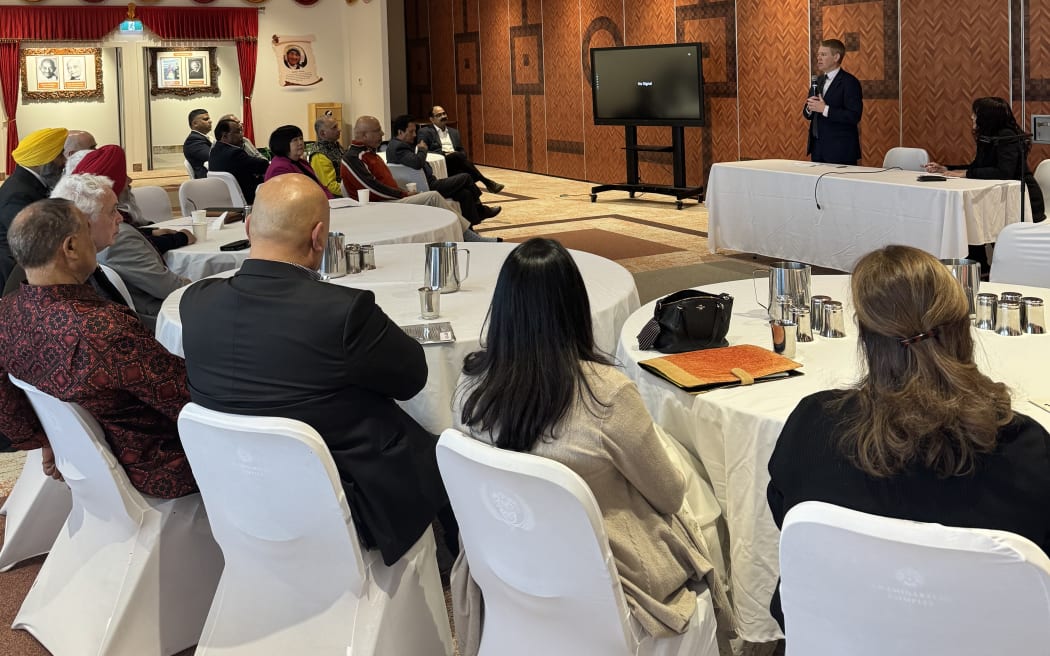Politics
Ethnic Leaders Urge Government to Enhance Social Cohesion Resources

Ethnic leaders in New Zealand are advocating for increased resources to address social cohesion and health disparities during a meeting with opposition leader Chris Hipkins in Auckland on March 15, 2024. The meeting brought together representatives from the National Ethnic and Faith Community Leaders Network, alongside Jenny Salesa, the Labour Party’s spokesperson for ethnic communities.
Following the closed-door event, Hipkins highlighted discussions that covered a range of issues affecting the general public, including employment, housing, and the rising cost of living, as well as specific concerns faced by migrant and religious communities, particularly regarding immigration policies. He noted that life has become increasingly challenging for ethnic communities since his last meeting with the group a year prior.
“Cost of living issues have worsened. Polarisation remains a significant concern when I engage with our communities,” Hipkins remarked. “There are growing tensions and more overt displays of racism, which deeply concern me.” He emphasized the necessity for government services, such as health and education, to reflect the diverse makeup of the community.
In response to inquiries about potential solutions, Hipkins stated that these challenges would inform the Labour Party’s policies leading up to the next election. “Part of the reason we are here is to ensure we are listening to New Zealanders as we develop our policies,” he said.
Concerns Over Social Cohesion and Health Services
The issue of social cohesion emerged as a focal point for Dame Ranjna Patel, who expressed apprehension about the increasing divide between ethnic communities and the mainstream society. “The social cohesion within the ethnic community and with the mainstream is very divided at the moment,” Patel observed. She urged for collaboration among diverse groups to generate effective solutions.
“We need to work together to address these bite-sized problems with equally manageable solutions. It is unrealistic to expect any government to solve everything without sufficient resources,” she added. Patel called for a budget that allows communities to develop their own capacity to deal with these pressing issues.
Debbie Chin, president of the Wellington branch of the New Zealand Chinese Association, focused her remarks on the health and wellbeing of Asian New Zealanders. “We are advocating for improved access to services tailored to our Chinese and Asian communities,” Chin stated. She emphasized the importance of having service providers who are culturally competent and capable of addressing the unique needs of these populations.
Chin referenced a recent report indicating that nearly half of Asian parents reported their children experiencing bullying at school over the past year, often linked to racism. “I hope the government will invest in initiatives that prevent bullying and foster an understanding that such behavior is unacceptable,” she said. “By doing so, we can build inclusion and social cohesion within our communities, workplaces, and schools.”
The discussions held in Auckland underscore the urgent need for a concerted effort to enhance resources and promote unity among New Zealand’s diverse communities, ensuring that all voices are heard and considered in policy development.
-

 World3 months ago
World3 months agoTest Your Knowledge: Take the Herald’s Afternoon Quiz Today
-

 Sports3 months ago
Sports3 months agoPM Faces Backlash from Fans During Netball Trophy Ceremony
-

 Lifestyle3 months ago
Lifestyle3 months agoDunedin Designers Win Top Award at Hokonui Fashion Event
-

 Sports3 months ago
Sports3 months agoLiam Lawson Launches New Era for Racing Bulls with Strong Start
-

 Lifestyle3 months ago
Lifestyle3 months agoDisney Fan Reveals Dress Code Tips for Park Visitors
-

 Health3 months ago
Health3 months agoWalking Faster Offers Major Health Benefits for Older Adults
-

 World3 months ago
World3 months agoCoalition Forms to Preserve Māori Wards in Hawke’s Bay
-

 Politics3 months ago
Politics3 months agoScots Rally with Humor and Music to Protest Trump’s Visit
-

 Top Stories3 months ago
Top Stories3 months agoUK and India Finalize Trade Deal to Boost Economic Ties
-

 Entertainment3 months ago
Entertainment3 months agoExperience the Excitement of ‘Chief of War’ in Oʻahu
-

 World3 months ago
World3 months agoHuntly Begins Water Pipe Flushing to Resolve Brown Water Issue
-

 Science3 months ago
Science3 months agoNew Interactive Map Reveals Wairarapa Valley’s Geological Secrets









